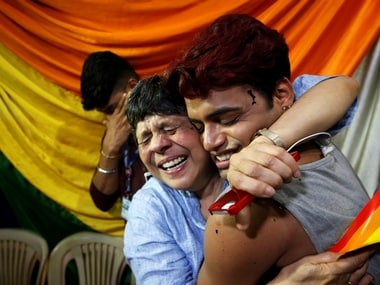We are finally “azaad in azaad Hind” remarked Ashok Row Kavi, LGBTQIA+ activist. He said this in the light of the epoch-making judgment in the case of Navtej Singh Johar & Ors. v. Union of India, Ministry of Law and Justice & Ors. A bench of CJI Dipak Mishra and Justices DY Chandrachud, Rohington Nariman, AM Khanwilkar and Indu Malhotra, in the above-mentioned case, decriminalised homosexuality. CJI Mishra and Justices Nariman, Chandrachud and Malhotra delivered separate, yet concurring judgments on Section 377 of the Indian Penal Code. No community, small or big, ought to live in fear and “history owes an apology to LGBT persons for ostracisation and persecution they faced because of society’s ignorance that homosexuality is a natural trait”, said Justice Indu Malhotra. Section 377, an archaic “colonial ghost”, had been in place for 158 years. It criminalised carnal intercourse against the “order of nature” i.e., homosexual sex and sodomy (oral, anal sex and bestiality) and though the law was rarely enforced, it perpetuated terror and repression. Despite being some of the sharpest minds in the country and having the best educational qualifications, members of the LGBT community are deprived of the rights and freedoms guaranteed by the Constitution. Following this judgment, there are many other rights that must be adjudicated upon. [caption id=“attachment_5131431” align=“alignleft” width=“380”]  Members of the LGBTQ community celebrate after the Supreme Court verdict on Section 377. Reuters[/caption] First are the civil rights that have been guaranteed to millions of Indians under Article 21 of the Constitution, but have been denied to members of the LGBT community. Article 21 protects the right to life and personal liberty and has a wide ambit, including the right to privacy, dignity and autonomy. The judiciary must protect homosexual people’s right to get married, to adopt children and to have a family. In addition to this, they must have a right to get divorced, to inheritance, to be maintained, etc. Domestic violence i.e. abuse in a domestic setting must also be penalised in same-sex relationships under the Protection of Women Against Domestic Violence Act (PWDVA). Secondly, sexual violence affects all demographics including the LGBTQIA+ community. The legislature and the courts must take steps to construct an inclusive definition of offences such as rape (Section 375 and 376 of the Indian Penal Code), sexual harassment (Section 354A of the Indian Penal Code), stalking (Section 354D of the Indian Penal Code) and word, gesture or act intended to insult the modesty of a woman (Section 509) among others. Thirdly, hate speech, if unpunished can go a long way in promoting “disharmony or feelings of enmity, hatred or ill-will” and can be “prejudicial to the maintenance of harmony” and “disturb the public tranquillity” of the LGBTQIA+ community. Section 153(A) of the Indian Penal Code should be amended to protect the sexual orientation and beliefs of the homosexual. Fourthly, the apex court said that the discrimination on the basis of sexual orientation is “deeply offensive to the dignity and self-worth of an individual” and is prohibited under Article 15 of the Constitution. From this, we must realise the need to protect the homosexual community from discrimination at the workplace and at educational institutions. It violates the right to equal opportunity given under Article 14 of the Constitution. Due to the stigma attached to homosexuality, members of the LGBT community don’t get appointed and promoted at their workplaces. Subramaniam Swamy recently said, “Legitimising homosexuality leads to commercial profit, since gay bars will be opened in all cities on foreign direct investment. It is a genetic flaw celebrated”. The legislature and judiciary can only do so much to change this orthodox mentality of Indian citizens. Homosexuality is not a disease that is meant to be cured, and it is high time that the people of India should accept the presence of the big rainbow-coloured elephant in the room. The author is a third year law student at Maharashtra National Law University, Mumbai
Members of the LGBT community are deprived of the rights and freedoms guaranteed by the Constitution.
Advertisement
End of Article


)

)
)
)
)
)
)
)
)



